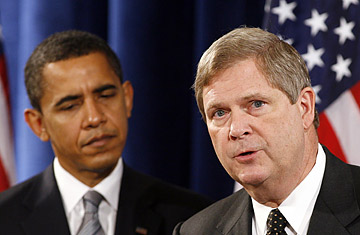
Tom Vilsack
Adding another former rival to his administration, Barack Obama has nominated former Iowa governor Tom Vilsack to be the next secretary of agriculture. Vilsack was not an ideal choice for advocates of sustainable agriculture, who had hoped Obama would choose someone less connected to powerful agribusiness interests (Iowa's economy is dominated by huge corn and pig farms). But Vilsack has shown an ability to think independently and some critics are hoping his credibility with Big Agriculture could help him bring about radical changes in the Department of Agriculture without looking too far out of step with the mainstream.
Fast Facts:
• He's 58, married and has two sons.
• He was abandoned at a Pittsburgh orphanage as a baby and adopted by local parents. While earning his bachelor's degree in history at Hamilton College in upstate New York, he met his future wife, Christie. He went on to earn a law degree from Albany School of Law and the couple moved to her hometown in Iowa.
• In 1986, after the mayor of Mount Pleasant, the Iowa town where Vilsack lived, was shot and killed, the mayor's father asked him to run for the office. He did in 1987, won and later went on to serve in the Iowa State Senate beginning in 1992. In 1998 he became the first Democratic governor in Iowa in 32 years, winning after being behind by some 20 points in the polls. He served a total of two terms.
• Vilsack has been a strong supporter of biotechnology. He was named Governor of the Year in 2001 by the Biotechnology Industry Organization.
• As governor, Vilsack signed into law a 2005 change that allowed convicted felons to vote after serving their sentences. Some 80,000 ex-cons became eligible to vote because of the change.
• Vilsack is an avid runner and ran a marathon in Arkansas in 2005 with the state's then-governor, Republican Mike Huckabee.
• He has been a proponent of subsidies for corn growers who produce ethanol, as well as wind-generated energy and farm-conservation programs. He is also in favor of working hard to stop global warming, one of the main reasons Obama selected him as secretary.
• Vilsack has never lost an election. He was reportedly the 2004 short list of possible vice presidential candidates to run with John Kerry. Vilsack was the first Democrat to enter the most recent presidential campaign, but he dropped out after just several months, saying he couldn't compete with the fundraising ability of other candidates. He quickly endorsed Hillary Clinton and became a national co-chair of her campaign for the Democratic nomination. Despite Vilsack's support, Clinton lost the Iowa caucus to Barack Obama.
• Since dropping out of the presidential race in 2007, Vilsack has worked as a lawyer in Iowa, been a fellow at the Kennedy School of Government at Harvard and worked for the Iowa State Biosafety Institute.
• With Vilsack as agriculture secretary, Iowans will arguably have more influence over U.S. farm policy than ever before — the Senate Agriculture Committee chairman is Tom Harkin, of Iowa.
Quotes About:
• "To have someone like Tom Vilsack, who understands Iowa the way he does, is going to be a tremendous benefit to us."
— Mike Tramontina, director of Iowa's Department of Economic Development, Des Moines Register, Dec. 16, 2008
• "It's hard to avoid the conclusion that this is agribusiness as usual. That said, there are reasons to be cautiously hopeful. Vilsack's spoken encouragingly about capping subsidies and using that money to drive a conservation agenda...On the other hand, he presided over the biggest expansion of feedlot agriculture in Iowa."
— Michael Pollan, author of In Defense of Food and a sustainable agriculture advocate, on Vilsack's prospects for bringing about change, National Public Radio, Dec. 18, 2008
•"He's probably a middle-of-the-road pick"
— Larry Sitzman, executive director of the Nebraska Pork Producers, on Vilsack as agriculture secretary, Omaha World Herald, Dec. 18, 2008.
Quotes By:
• "When you've paid your debt to society, you need to be reconnected and re-engaged in society."
— on why convicted felons who have served out their sentences should be allowed to vote, New York Times, June 18, 2005
• "I don't think the face of the Democratic Party is Nancy Pelosi."
— arguing his party should be seen as more centrist than the House Speaker, New Yorker, May 29, 2006
• "We're going to move from a commodity economy where you basically grow the same kind of crops — where a kernel of corn is a kernel of corn is a kernel of corn — to an ingredient economy where there will be a kernel of corn that will be designed for fuel, there will be a kernel of corn designed for livestock, there will be kernels of corn that will be used to make paper or fabric for clothes."
— on the future of corn farming in America, Politicalbase.com, Oct. 20, 2008
• "Deep down most of them know the system needs to be changed."
— on farmers' thoughts about the U.S. government's massive farm subsidy program, Washington Post, Dec. 22, 2006
See TIME's Person of the Year, People Who Mattered, and more.
